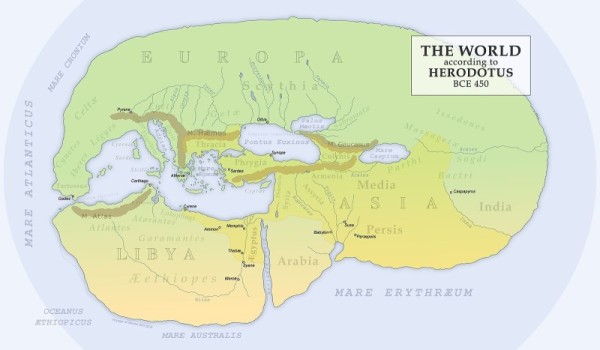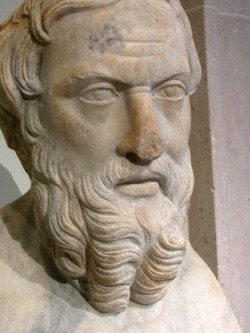If thou thinkest thyself able to make opposition to my power, stand thou still and cease from wandering abroad, and fight.”

Translated by George C. Macaulay — our special project presenting the complete Herodotus with URLs for all of those people, places, events, and things which baffles and discourages modern readers.
Previously on Herodotus
121. Having formed this plan the Scythians went to meet the army of Darius, sending off the best of their horsemen before them as scouts; but all the wagons in which their children and their women lived they sent on, and with them all their cattle (leaving only so much as was sufficient to supply them with food), and charged them that they should proceed continually towards the North Wind. These, I say, were being carried on before:
122, but when the scouts who went in front of the Scythians discovered the Persians distant about three days’ march from Ister, then the Scythians having discovered them continued to pitch their camp one day’s march in front, destroying utterly that which grew from the ground: and when the Persians saw that the horsemen of the Scythians had made their appearance, they came after them following in their track, while the Scythians continually moved on. After this, since they had directed their march towards the first of the divisions, the Persians continued to pursue towards the East and the river Tanais; and when the Scythians crossed over the river Tanaïs, the Persians crossed over after them and continued still to pursue, until they had passed quite through the land of the Sauromatai and had come to that of the Budinoi.
123. Now so long as the Persians were passing through Scythia and the land of the Sauromatai, they had nothing to destroy, seeing that the land was bare, but when they invaded the land of the Budinoi, then they fell in with the wooden wall, which had been deserted by the Budinoi and left wholly unoccupied, and this they destroyed by fire. Having done so they continued to follow on further in the tracks of the enemy, until they had passed through the whole of this land and had arrived at the desert. This desert region is occupied by no men, and it lies above the land of the Budinoi, extending for a seven days’ journey; and above this desert dwell the Thyssagetai, and four large rivers flow from them through the land of the Maiotians and run into that which is called the Maiotian lake, their names being as follows: Lycos, Oaros, Tanaïs, Syrgis.
124. When therefore Darius came to the desert region, he ceased from his course and halted his army upon the river Oaros. Having so done he began to build eight large fortifications at equal distances from one another, that is to say about sixty furlongs, of which the ruins still existed down to my time; and while he was occupied in this, the Scythians whom he was pursuing came round by the upper parts and returned back to Scythia. Accordingly, since these had altogether disappeared and were no longer seen by the Persians at all, Darius left those fortifications half finished, and turning back himself began to go towards the West, supposing that these were the whole body of the Scythians and that they were flying towards the West.
125. And marching his army as quickly as possible, when he came to Scythia he met with the two divisions of the Scythians together, and having fallen in with these he continued to pursue them, while they retired out of his way one day’s journey in advance: and as Darius did not cease to come after them, the Scythians according to the plan which they had made continued to retire before him towards the land of those who had refused to give their alliance, and first towards that of the Melanchlainoi; and when Scythians and Persians both together had invaded and disturbed these, the Scythians led the way to the country of the Androphagoi; and when these had also been disturbed, they proceeded to the land of the Neuroi; and while these too were being disturbed, the Scythians went on retiring before the enemy to the Agathyrsians. The Agathyrsians however, seeing that their next neighbors also were flying from the Scythians and had been disturbed, sent a herald before the Scythians invaded their land and proclaimed to the Scythians not to set foot upon their confines, warning them that if they should attempt to invade the country, they would first have to fight with them. The Agathyrsians then having given this warning came out in arms to their borders, meaning to drive off those who were coming upon them; but the Melanchlainoi and Androphagoi and Neuroi, when the Persians and Scythians together invaded them, did not betake themselves to brave defence but forgot their former threat and fled in confusion ever further towards the North to the desert region. The Scythians however, when the Agathyrsians had warned them off, did not attempt any more to
come to these, but led the Persians from the country of the Neuroi back to their own land.

CC BY-SA 2.0 image from Wikipedia.
126. Now as this went on for a long time and did not cease, Darius sent a horseman to Idanthyrsos king of the Scythians and said as follows:
Thou most wondrous man, why dost thou fly for ever, when thou might do of these two things one? If thou thinkest thyself able to make opposition to my power, stand thou still and cease from wandering abroad, and fight; but if thou dost acknowledge thyself too weak, cease then in that case also from thy course, and come to speech with thy master, bringing to him gifts of earth and water.”
127. To this the king of the Scythians Idanthyrsos made answer thus:
My case, O Persian, stands thus: Never yet did I fly because I was afraid, either before this time from any other man, or now from thee; nor have I done anything different now from that which I was wont to do also in time of peace: and as to the cause why I do not fight with thee at once, this also I will declare to thee. We have neither cities nor land sown with crops, about which we should fear lest they should be captured or laid waste, and so join battle more speedily with you; but if it be necessary by all means to come to this speedily, know that we have sepulchres in which our fathers are buried; therefore come now, find out these and attempt to destroy them, and ye shall know then whether we shall fight with you for the sepulchres or whether we shall not fight. Before that however, unless the motion comes upon us, we shall not join battle with thee. About fighting let so much as has been said suffice; but as to masters, I acknowledge none over me but Zeus my ancestor and Hestia the queen of the Scythians. To thee then in place of gifts of earth and water I shall send such things as it is fitting that thou should receive; and in return for thy saying that thou art my master, for that I say, woe betide thee.”
This is the proverbial saying of the Scythians.
– Herodotus, Book IV
| <—Previous | Master List | Next—> |
Herodotus made his living by being interesting. In a world where most people did not read and could not afford to buy a book even if they could, they would pay to listen to Herodotus recite from his books. They would not pay to be bored. In that world, the names that populate his stories would have some general familiarity to his audience. Their obscurity to us is a barrier that this series seeks to break down.
MORE INFORMATION
MAP LIBRARY
Because of lack of detail in maps as embedded images, we are providing links instead, enabling readers to view them full screen.

Like!! Great article post.Really thank you! Really Cool.